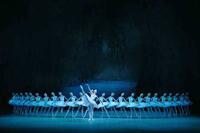SUBMIT UPDATES
And yet these answers are no proof of standard thinking but rather the logical result of an intense creative life. Swan Lakeis a ballet without which it is impossible to imagine contemporary classical theatre, and in terms of its psychology it is bang up to date. The classical qualities of Swan Lakelie in the precise structural forms, in the strict classical school and in the traditional split of classical and character dance. Its psychology lies in the mysterious theme of duplicity and the well-developed theme of fate and destiny.
Nevertheless, when it appeared in 1877 there was no instant acclaim for Swan Lake. The production staged at the Bolshoi Theatre by Vaclav Reisinger was “one of many”, extremely traditional and in no way innovative. The famous “Russian soul” was absent in it, and neither was there the eternal symbol of Russian spirituality in the image of the Swan. And Tchaikovsky’s music, in turns mournfully aching, festively triumphant and menacingly fatal, was not regarded as a masterpiece for a long time to come. Initially, Pyotr Ilyich’s opus was received in a very restrained manner: people felt that the ballet was “poor in melodies” and the music “the weakest point of all.” The spirituality in the first production was hard to find: much was hidden by the corps de ballet which rigorously waved their cardboard wings at the premiere – today one could only imagine such a thing in a parody of the ballet! And only the name of Polina Karpakova, who went down in history as the first performer of the role of Odette (the name of the performer of the role of Odile was covered by three stars on the playbill), tells us that the history of the ballet did not begin in St Petersburg.
But it was in the city on the River Neva that the White Swan “built its nest.” Following a concert in memory of the composer at the Mariinsky Theatre in 1895, when Lev Ivanov showed a “swan scene” – gentle, tender and touching – Marius Petipa, the director of the ballet company in St Petersburg, finally resolved to stage Tchaikovsky’s debut in the dance genre at the Imperial theatre. The premiere took place one year later, in 1896. The conductor and composer Riccardo Drigo undertook a very tactical musical revision of the score – it is his version of the music for Swan Lakethat most choreographers follow. The Frenchman Petipa and the Russian Ivanov (the choreographers), the Italian Drigo (conductor and author of this version of the music) and Pierina Legnani as Odette-Odile – these are the creators of the famous myth of Swan Lake.
In the more than century-long existence of Swan Lakeat the Mariinsky Theatre, the production has been radically altered on just three occasions, which, you must agree, is very little for a ballet that is over a hundred years old. The most radical, however strange it may seem, was by a woman – Agrippina Yakovlevna Vaganova, the famed teacher and excellent soloist (in Swan Lake, apropos, she did not particularly stand out at all). She attempted to simplify the mysticism of the libretto and the music, presenting the story of the swan-maiden as the sick hallucinations of an erudite youth, mercilessly killing off the protagonists with no right to resurrection in the finale (in the 1896 production Odette and Siegfried, once dead, were reunited in the afterlife). All that remains of Vaganova in the current production, however, is the “swan-like” turns of the arms and the dance meeting of Odette and Siegfried: Agrippina Yakovlevna, dissatisfied with the fussy pantomime nature of this scene, created highly imagistic choreography. Ten years later Fyodor Lopukhov, another classic of Soviet ballet, resolved to let the male protagonist live and moreover restored Odette’s human image – in the finale she became a woman. But this production too, memorable for von Rothbart’s excellent variation, remained in the theatre’s repertoire for just five years before it was replaced by the version of Konstantin Sergeyev, one of the finest Siegfrieds of all time anywhere, in which the dancer and choreographer, true to classical dance, combined the very best that had been created for Swan Lakein the course of half a century. Today, too, this production is considered the epitome of classical dance imagery. It was this version recorded on film that documents the lyrical dance of Galina Ulanova, the virtuoso sparkle of Natalia Dudinskaya, the classical perfection of Gabriela Komleva and the mutinous passion of Galina Mezentseva.
- Peter Ilyich Tchaikovsky
Authors
Ages: Age category 6+
Cast and Creative team for Swan Lake at Mariinsky Theatre
Conductor: Boris Gruzin
Odette-Odile: Ulyana Lopatkina
Siegfried: Yevgeny Ivanchenko
von Rothbart: Andrei Yermakov
The Prince’s Friends: Nadezhda Batoeva, Sofia Ivanova-Skoblikova, Filipp Stepin
The Jester: Vladislav Shumakov
Music by Pyotr Tchaikovsky
Libretto by Vladimir Begichev and Vasily Geltzer
Choreography by Marius Petipa and Lev Ivanov (1895)
revised choreography and stage direction: Konstantin Sergeyev (1950)
Set design by Igor Ivanov
Costume design by Galina Solovyova
Lighting Adaptation for the Mariinsky II by Andrei Ponizovsky
Odette-Odile: Ulyana Lopatkina
Siegfried: Yevgeny Ivanchenko
von Rothbart: Andrei Yermakov
The Prince’s Friends: Nadezhda Batoeva, Sofia Ivanova-Skoblikova, Filipp Stepin
The Jester: Vladislav Shumakov
Music by Pyotr Tchaikovsky
Libretto by Vladimir Begichev and Vasily Geltzer
Choreography by Marius Petipa and Lev Ivanov (1895)
revised choreography and stage direction: Konstantin Sergeyev (1950)
Set design by Igor Ivanov
Costume design by Galina Solovyova
Lighting Adaptation for the Mariinsky II by Andrei Ponizovsky



